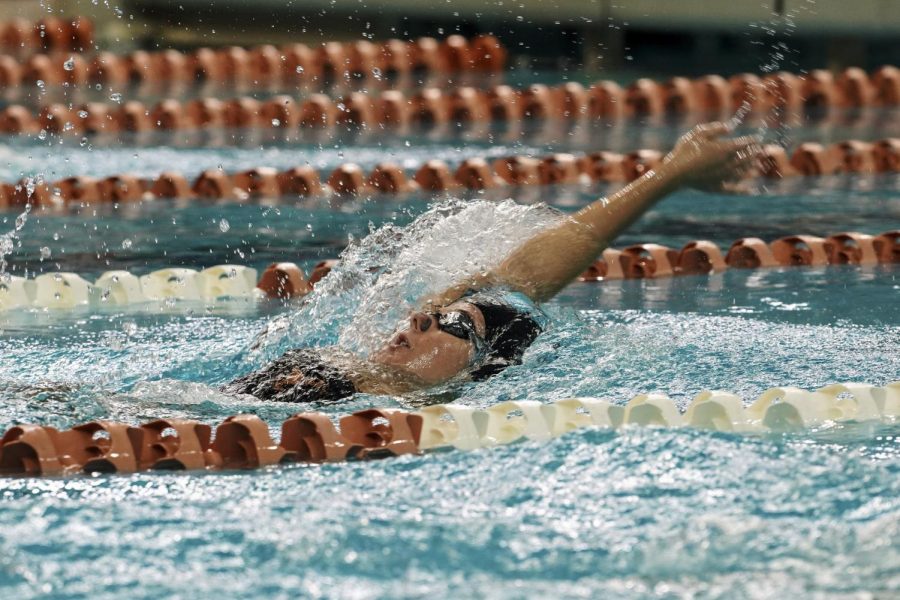“It’s brave to ask for help”: Swimmer Olivia Bray talks mental health, activism, athletics
Junior Olivia Bray swims the backstroke at a swim meet against Texas A&M and Indiana on Oct. 21, 2022.
December 1, 2022
Junior Olivia Bray is a butterfly and backstroke swimmer from Daleville, Virginia. Over the last two years, she has been an outspoken advocate for mental health awareness within the sports world.
After a long struggle with her mental health, which she said stemmed from an eating disorder, Bray attended an in-person treatment center in the summer of 2020. Afterward, she started speaking out in order to help others not feel alone.
“I started talking about eating disorders, mental health and just ways to not feel alone,” Bray said. “I never want anyone to feel the way I did.”
Asking for help is the first step to accepting it, and then moving through it and trying to get better.
— Olivia Bray
The main message she wants people to hear is that it’s important to ask for help.
Asking for help is one of the scariest things that a person can do, but it is the first step that needs to be taken in order to make progress in bettering one’s mental wellness.
Since the COVID-19 pandemic uprooted many lives, mental health, particularly in athletics, has been talked about much more than before. Four-time Olympic gold medalist Simone Biles’ struggles during the Tokyo Games in 2020 helped open up the mental health conversation, as more athletes began posting on social media about the widespread problem.
It is no secret that sports can affect someone’s mental health, particularly at higher levels of competition. The added pressure can heavily affect an athlete, especially at a major university like UT, where they are idolized and watched by tens of thousands of people.
Bray had high praise for the University regarding how it supports athletes in dealing with the added stress.
“There are a lot more outlets and support systems that athletes have,” Bray said. “At UT, we have behavioral health (specialists and) nutritionists.”
People outside of the sports world often don’t understand the mental strain that competing brings with it, which can be an issue for athletes struggling with their mental health. Individuals can perpetuate stigmas about the issue that have negative effects, like telling athletes to just push through. In her experience, however, Bray said that all of this is just part of the cost of being an athlete and performing on the biggest stage.
“That’s just something you have to deal with and learn how to manage if you choose to pursue an athletic career,” Bray said.
Bray hopes to emphasize that for anyone struggling with mental wellness and mental health issues, the only way to see improvement is to ask for help.
While doing so is one of the scariest things to do, she said, it is also one of the bravest and most important things you can do.
“If you don’t ask for help you’re probably going to stay in that hole, maybe dig that hole a little deeper, but you probably won’t be able to get out of that,” Bray said. “Asking for help is the first step to accepting it, and then moving through it and trying to get better.”



